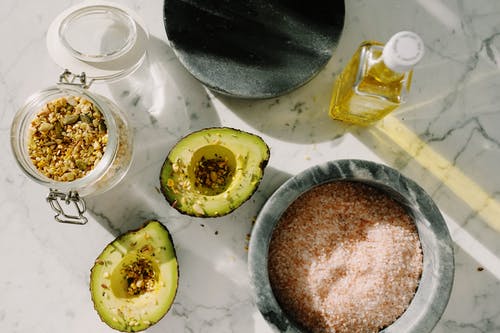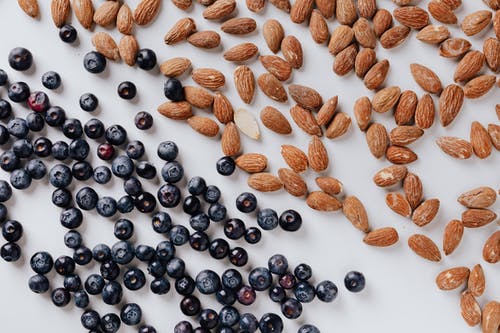While what we eat is by no means the be all and end all of health and happiness there are ways we can eat to support our healthiest brain function and therefore increase our happiness.
That is for certain.
Maybe not in the ways you’re thinking, definitely not in the ways we’re often sold (buy this pill or magical colourful shake and you will become the happiest unicorn immediately upon ingesting) and often not in the ways we tend to go about doing it (limiting our intake to vegetables as #helth) but it’s true, food really can affect our mood.
I’m talking about more than just the momentary happiness found in sharing a late brunch with friends or eating ice-cream from the tub whilst snuggled on the couch with the love of your life.
I’m talking the sciency side of how you can eat to truly enhance and support your long-term happiness.
What Does Eating For Happiness Really Look Like?

In a nutshell the vital signs that you are eating for happiness are eating what you want, in an amount you want, when you want and because of this you have the energy to enjoy your life and use your brain to focus on your work, contributing to society and being present with your loved ones.
Simple criteria, right?
Well, yes it is but given that this truly does mean full and unconditional permission to listen to and respond to your body it becomes simple but not easy.
Actually, it’s almost not even the norm (unless your under the age of 7 then you’re most likely still winning at this) and more something worth investing the time to relearn.
The thing is, few people truly trust themselves enough to grant themselves this level of permission because they think it will mean eating the 5 tubs of ice-cream followed by an entire chocolate cake.
When the reality is, as a full grown adult it is time to recognise that you are the adult and as the adult you can choose to eat the 5 tubs of ice-cream and the entire chocolate cake, or not.
It is your choice and if you freely choose it, no choice you could ever make is right or wrong.
It is when it is not a choice that we experience a problem.
It is when we feel compelled to eat the five tubs of ice-cream and the entire chocolate cake (and let’s face it this is always a compulsion because no fully functioning, happy and fulfilled human being does choose this option) that the pain exists.
The psychology of eating for happiness is as simple as recognising what your body wants, respecting what your body wants and responding to what your body wants.
I honestly believe that despite the vast array of less than nutritious foods available, the undeniably wonderful marketing of them and the overwhelming confusion over just what constitutes healthy eating… our bodies truly can tell us what they want, and we can all eat well.
Simply by learning to listen.
The tricky part is that more often than not learning to listen to your bodies requires more than just wanting to learn and wanting to be ok with your body and with food.
It requires outside help because while we are all born with an innate ability to self-regulate in most cases to varying degrees, we learn to question this.
We learn to suppress this and ultimately ignore our body’s infinite wisdom in the name of “health”, in the name of “fitting in”, in the name of “not being a burden” and in the name of being “good”. All to the point where we end up confused, overwhelmed and so incredibly out of touch with our body that we truly couldn’t identify what it is we want even if we were to check in and ask, let alone go ahead and give it to ourselves.
If you feel in any way out of control around food or controlled by food get help before you even consider going further with looking at specific micronutrients or macronutrients or anything more health nuanced because your relationship with food is first and foremost what will most impact your happiness in the long term.
Your relationship with food is far more impactful than what you eat.
Creating a healthful relationship with food is simply a skill you have to (re)learn and nothing more difficult, shameful or embarrassing than this.
Taking it Further; 5 Tips for Eating for Happiness
Tip #1 Energy (Macronutrients)

Without abundant energy you’re never going to experience the level of happiness you could!
There simply is no happiness found in being low in energy.
By not meeting your energy needs over time you are far more likely to develop nutritional deficiencies and malnutrition which will have huge effects on your mood including causing or enhancing anxiety, depression, irritability and anger.
You simply cannot live a happy life without the energy to fuel curiosity, play, creativity and connection with others.
Meeting your energy needs means eating all the macronutrients (carbs, fats and proteins) in amounts which are satisfying to you.
Tip #2 Fats

When it comes to supporting a healthy brain long term, fat is king (or queen).
Every one of your neurons in your brain is enveloped in what’s called a myelin sheath which is essentially a layer of insulating fat.
This sheath allows for the fast and smooth transmission of impulses, information and messages from one neuron to another meaning your brain can perform at its best.
The greatest fats to focus on are monounsaturated and polyunsaturated fats which can be found in olive oil, avocado, nuts and seeds as well as fish.
Tip #3 Carbs

Your brain loves carbs.
The glucose released from the breakdown of the carbs you eat is your brains preferred source of fuel and diets low in carbs have been linked to decreased learning, concentration and memory as well as lowered mood and enthusiasm.
Some nutritious carb sources to make sure you’re including in your daily diet are any of the wholefoods such as wholegrain bread, brown rice, sweet potato, potato, corn and quinoa.
Tip #4 Protein

The happiness neurotransmitters dopamine, serotonin, oxytocin and endorphins are all derived from protein.
Which means if you want your brain to be able to produce great levels of these make certain you’re including a variety of protein sources in your diet such as fish, chicken, red meat, eggs, tofu, beans, tempeh and nuts.
Taking it Further Again
If you have the macronutrients under control and are eating an adequate variety of carbs, fats and protein containing foods regularly the next place to look to give your happiness a boost is the micronutrients.
Tip #5 Micronutrients (Vitamins and Minerals)

A deficiency in any of the micronutrients is going to show up as you feeling less than you could, happiness wise and this could range from mild low energy to full blown clinical depression.
To give you just one example of how the micronutrients are tied into health and happiness let’s take the case of the conversion of dietary protein into dopamine (known as the feel-good neurotransmitter).
This process requires a series of steps and at each step there are various enzymes and micronutrients involved including zinc, vitamin B6, folic acid, magnesium, manganese, iron, copper and vitamin C and that’s for the efficient production of just one of the neurotransmitters.
So, you can see healthy production of the happiness hormones depends on more than simply eating protein…
Take Home Tips for Eating for Happiness

The most important component of eating for happiness will always be your relationship with food (which reflects the relationship you have with yourself).
Eating what you want, when you want and in amounts you want is the ultimate goal.
If you struggle with what you eat in any way this is the place to heal before you move on to even attempting healthy eating for happiness.
Going beyond this, eating for happiness is first and foremost about meeting your requirements for the macronutrients (carbs, fats and proteins) both because of their structural (building block) role as well as their provision of energy.
Next there is the option of focusing on micronutrients (vitamins and minerals) which we know are important to maintaining good brain health and the production of neurotransmitters associated with feelings of happiness. The best tip for ensuring you are meeting your micronutrient needs is to eat a wide variety of foods because each food contains different micronutrients in different quantities.
What you eat has the ability to enhance or limit your health and your health definitely includes your happiness.
If you want to find out specific ways you can eat which will best support your short term and long term happiness (and probably help you live longer too), I highly encourage you to make the phone call and book a consult with a food and nutrition expert (a Dietitian!).
With my whole heart I hope you found this information useful and inspiring.

Become Great. Live Great.
Bonnie.


